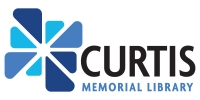Material Selection Policy: Curtis Memorial Library, Brunswick, Maine: Approved by Curtis Board of Directors 1-21-10, revised May, 2017, revised July, 2023:
SELECTION PRINCIPLES
A written materials selection policy aids the Library staff in building a useful, well-rounded collection to meet the needs of the community. A policy statement also helps the Board to determine whether the staff is doing an acceptable job of building a collection that is relevant to community needs and one that meets accepted standards of quality. Finally, a policy statement helps to answer questions from the public regarding the presence or absence of certain materials, and shows the basis on which materials have been selected.
- The library, under the direction of the Director, and with the participation of the staff, will provide any materials which help meet its objectives. Materials may include books, periodicals, newspapers, films, maps, recordings, microforms, computer software, online databases and realia.
- The library will not purchase textbooks needed for formal courses of study in local schools or institutions of higher learning.
- The library will maintain an up-to-date collection of resources covering a broad range of subjects both in its non-fiction and fiction collections.
- The library will keep itself informed of other publicly available resources in the area to avoid unnecessary duplication.
METHOD OF RESOURCE SELECTION
Any materials selection policy must be fairly general, and librarians must always exercise their knowledge and experience of all library materials and of the community served. Best practices in collection development assert that materials should not be excluded from a collection solely because the content or its creator may be considered offensive or controversial. Refusing to select resources due to potential controversy is considered censorship, as is withdrawing resources for that reason. Libraries have a responsibility to defend against challenges that limit a collection’s diversity of content. Challenges commonly cite content viewed as inappropriate, offensive, or controversial, which may include but is not limited to prejudicial language and ideas, political content, economic theory, social philosophies, religious beliefs, scientific research, sexual content, and representation of diverse sexual orientations, expressions, and gender identities.
Certain methods and principles must be followed as closely as possible, as outlined below.
- Criteria: Each type of material must be considered in terms of its own merit and intended audience. All selections, both purchases and gifts, must meet some of the following criteria:
- Appeal to the interests and needs of individuals in the community
- Significant value as source material or for interpretation
- Vitality and originality of thought
- Contemporary significance
- Artistic excellence
- Entertaining presentation
- Accuracy and objectivity
- Suitability of physical form to library use
- Skill, competence of the author
- Relations to other materials and existing areas of coverage in order to maintain a well balanced collection
- Reviews: Reviews in professionally recognized periodicals are a primary source for material selection. Standard bibliographies, booklists by recognized authorities and the advice of competent people in specific subject areas will be utilized.
- Requests: All requests from patrons for specific titles or subject requests will be considered. Whenever there is enough demand or interest in a title or subject, an item with unfavorable reviews may be purchased unless it is completely without literary or social value, or the subject in question is already adequately covered by better materials.
- Specialized Materials: Specialized materials of limited community interest will not ordinarily be purchased. Interlibrary loan will be used to supply patrons with these materials. Supplementary materials for students and information for specialists are provided on a limited basis.
- Cost will also be a factor in resource collection.
WITHDRAWAL OF RESOURCES
- Materials which are no longer useful in the light of the stated objectives of the library will be systematically weeded from the collection according to accepted professional practices, and based on the following guidelines:
- Remove physically worn out or damaged material
- Eliminate obsolete information
- Remove resources that are no longer in demand
- Disposition of withdrawn materials is the responsibility of the Director..
REQUESTS FOR WITHDRAWAL OF OBJECTIONABLE RESOURCES
- If a patron (a patron is defined as a citizen of Brunswick or Harpswell who has a current Curtis library card) expresses objection to material in the library collection, the librarian receiving the complaint will listen to the patron’s concerns, explain CML’s materials selection policy to the patron, and ask the patron if they would like to fill out a Request for Reconsideration form. (A non-librarian staff member receiving the complaint will refer the patron to a librarian.). Only patrons as defined above may challenge titles.
- Upon receipt of a written complaint, the Director and the appropriate department manager will determine if material meets the standards of the selection policy and will inform the patron of the decision. The Director will also keep the library Board informed of any major challenges to materials in the library. Materials subject to complaint shall not be removed from use pending final action.
- If a book has been challenged and reviewed, the Library will not review it again for another year.
REPLACEMENT OF LOST MATERIALS BY PATRONS
Patrons are required to compensate the library for lost materials through payment for the items. Replacement copies are not preferred but will be accepted on a case-by-case basis.
